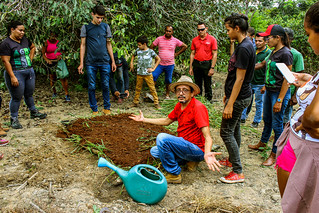44 families were visited at the beginning of the diagnosis in Tocantins
In the communities of Ilha Verde and Arraias, in the municipality of Babaçulândia, and Dom Bosco and Lago Azul in the municipality of Filadélfia, the technical team of the project “Use of social technologies to reduce deforestation” has begun the diagnosis to select the families that will benefit.
The project is an achievement of the Movement of People Affected by Dams (Movimento dos Atingidos por Barragens – MAB) and will be implemented by the Interstate Agricultural Development Association (Associação de Desenvolvimento Agrícola Interestadual – ADAI), with resources from the Amazon Fund (Fundo Amazônia). With the project, ADAI and the Movement are proposing to implement 240 integrated and sustainable agroecological production units (PAIS), contributing to food sovereignty and income generation in an environmentally sustainable way for riverside dwellers and family farmers affected by dams, in the states of Pará, Mato Grosso, Rondônia and Tocantins. This methodology, with circular gardens with a chicken coop in the center, makes it possible to grow diversified and healthier food for consumption and sale.
These visits were made with the aim of making a diagnosis and finding out what productive activities these affected farmers carry out, what their economic base is in addition to productive activity, and what their families’ income is. According to Agostino Chaves, the project’s agricultural sciences professional in the region, “this is diagnostic work and, at the same time, getting to know the families to be covered” and “an extremely important stage in the project”. In Tocantins, 30 units of the project will be implemented.



